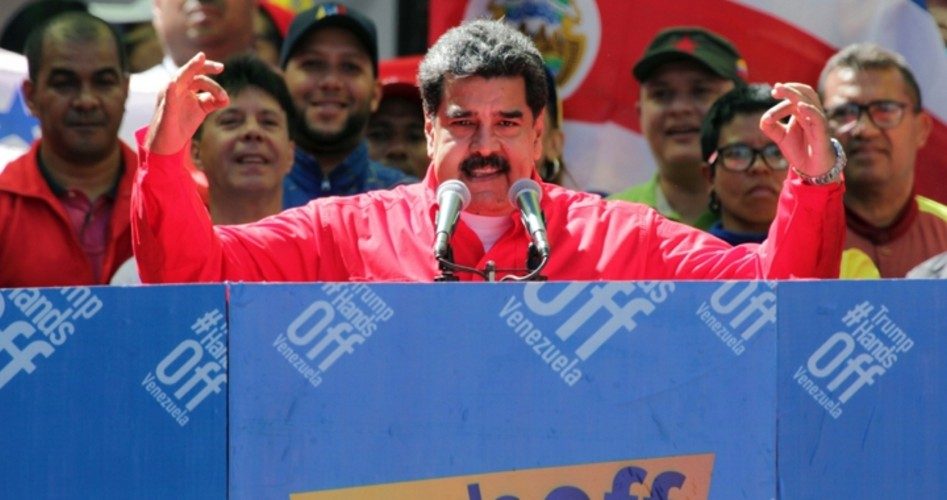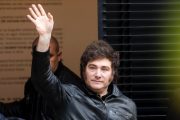
At 6:40 a.m. Wednesday, four heavily armed agents from Venezuelan President Nicolás Maduro’s military counterintelligence service arrived at U.S. journalist Cody Weddle’s apartment in Caracas with a search order. They arrested him and his assistant, Carlos Camacho, put them in a blacked-out military vehicle, and took them to military headquarters for questioning. The agents ransacked his apartment and removed all of his video-recording and related equipment.
Both were masked and hooded for hours before being questioned about their work. Upon his release afterwards, Weddle said: “They wanted to know about the work I did, who I worked with. They wanted to know what kind of military people I’ve spoken to, what type of opposition politicians I know … who were the opposition politicians I spoke to in the past few days.”
They tried to pressure Weddle into generating some pro-Maduro propaganda as well, guiding his answers while they videotaped his responses. They sought, he said, to get him to say “that Juan Guaido is not the president, and that the [awful] situation [here] is a result of [U.S.] sanctions.
The New York Times reported that the questioning of Weddle and his associate ended when “the people present appeared to grow worried about the attention his detainment was receiving” and they took him to the airport and sent him home. His associate, a Venezuelan citizen, was released. Neither was charged.
Just a day earlier, a representative for the U.S. State Department’s Bureau of Western Hemisphere Affairs told the Washington Examiner: “We hold Nicolas Maduro and those who surround him fully responsible for the safety and welfare of interim President Guaido and his family.” That same message was delivered by Secretary of State Mike Pompeo to Russian Foreign Minister Sergey Lavrov last Saturday. Pompeo made it clear that an attack by Maduro or his people on Guaidó “would represent a major escalation of tensions.”
It may safely be assumed that such warnings would also apply to Americans living in Caracas with valid residency permits. If that assumption is correct, Maduro is playing with fire by deliberately detaining Weddle and his assistant.
This incident came just days after a similar harassment of American journalist Jorge Ramos and five members of his team from New York-based Univision working in Caracas. Ramos had obtained a face-to-face interview with Maduro, which ended abruptly when Maduro didn’t like the direction in which the interview was going. When Ramos showed Maduro a cellphone video of some citizens raiding a garbage truck and then asked for his response, the dictator ended the interview and ordered some of his thugs to arrest Ramos and his team. Senator Marco Rubio (R-Fla.), an active observer of the unwinding of the Maduro regime, showed the offending cellphone video on Twitter: “This is the video that upset the dictator. [Jorge] recorded it on his cell phone on the streets of Caracas. When he played it for Maduro during the interview the dictator got angry & detained him & his crew in a dark room for over 2 hours.”
Upon his release, Ramos explained that “He [Maduro] didn’t like the things we were asking, about the lack of democracy in Venezuela, [about] the torture of political prisoners, about the humanitarian crisis that they are living.”
According to the National Union of Press Workers, Weddle, Ramos, and their team members joined nearly three dozen other reporters and journalists Maduro has arrested, detained, manhandled, and deported just in the last two months.
Eva Golinger, a longtime supporter of Maduro’s predecessor Hugo Chávez, saw the danger and the fine line that Maduro is treading. On Wednesday, Golinger tweeted, “Reports in Venezuela that US journalist Cody Weddle has been detained by Venezuelan military intelligence, his home raided. If true, this is extremely problematic and a very dangerous move for the Maduro government to make. Trump is waiting for any excuse to intervene.”
The warning was repeated by Phil Gunson, a political consultant at the International Crisis Group: “Having military intelligence arrest a US citizen … seems like [an] unnecessary provocation.”
The recent provocations are unnecessary, and deliberate. Do these raids and detentions, these invasions of private residences and theft of private property, indicate that Maduro is testing the Trump administration to see just how far he can push before one or more of those “options on the table” are exercised?
Does the dictator have a death wish?
Photo: AP Images
An Ivy League graduate and former investment advisor, Bob is a regular contributor to The New American, writing primarily on economics and politics. He can be reached at [email protected].
Related article:



